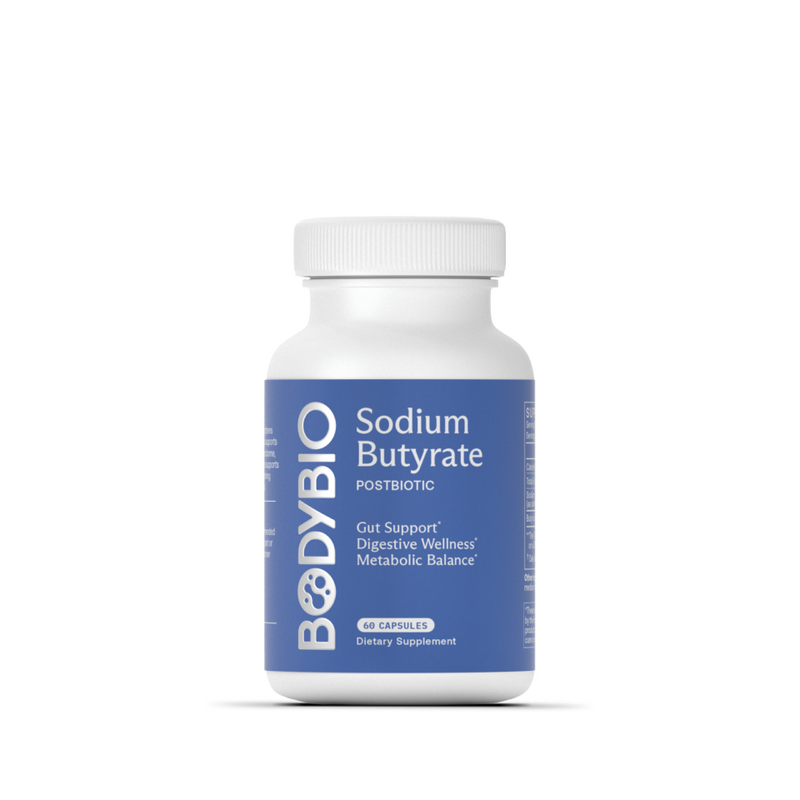Ready to Heal Your Gut? How to Find the Best Gut Health Supplements For Your Microbiome
Authors:

Ashley Palmer
Nutritional Therapy Practitioner, Health & Wellness Expert
Key Takeaways:
Key Points:
- Keeping your gut healthy is more important than ever in today’s world because it is often ground zero for many common health issues, including metabolic disease and digestive conditions.
- Gut health supplements, including postbiotics, fiber, and zinc are scientifically proven to support a healthy gut environment.
- Lifestyle choices also have a significant impact on gut health, so don’t forget to practice good sleep habits, exercise, and eat a nutrient-rich diet.
Maybe you’re on the vacation of your dreams and your stomach begins to sound the distress alarm. Or you’re at the movies and you want to treat yourself to popcorn, but you’re worried your digestive system won’t let you enjoy it. Perhaps you just want to support your overall health and naturally boost your beneficial bacteria and gut microbiome.
If you’ve ever dealt with any of the above, you’ve come to the right place. Let’s unpack the world of gut health supplements and everything you need to know to find the right supplements to improve your gut health.
Table of Contents:
-
What is Gut Health?
-
How Does the Microbiome Affect Your Gut Health?
-
What are the Benefits of Gut Health Supplements?
-
What Supplements Should You Take for Your Gut?
-
What Are Other Ways to Improve Gut Health?
-
Next Steps: Support Your Gut Health Today
What is Gut Health?
Gut health refers to the well-being of your entire digestive tract, including your mouth, stomach, intestines, and rectum. Your digestive system breaks down food with enzymes, bile, and other digestive fluids so that your body can absorb and use microscopic nutrients from food.
The gut microbiome is one of the essential foundations of gut health, referring to the trillions of microorganisms that live along your gut lining. The live microorganisms that are your gut bacteria can impact everything from weight and sleep to mood and systemic inflammation. Supporting the good bacteria in your gut is one of the most important actions you can take to support your overall health, not just your gut health.
How Does the Microbiome Affect Your Gut Health?
One way to think of the relationship between your microbiome and your gut health is through the analogy of a city’s waste services and the well-being and cleanliness of a city’s streets. Just as a city and its streets depend on waste services to keep it clean, functional, and free of roadblocks, your gut health depends on its microbiome to break down and digest food, absorb nutrients, and keep things moving.
The microbiome is one of the most complex systems in human biology and something researchers are continuing to discover, akin to the deep sea or outer space. Known as axes, the microbiome has bidirectional relationships with multiple essential health systems, including our cardiovascular, skin, hormone, and immune systems. Likewise, external factors like stress, certain foods, and medications can impact the microbiome.
These complex pathways mean that changes to your health or microbiome can cause disruptions to the production of digestive fluids like enzymes and stomach acid that impact everything from food digestion and absorption to immune function. While everybody is different, disruptions to the microbiome often trigger acute digestive symptoms like gas, diarrhea, constipation, and even autoimmune and mood effects.
What Are the Benefits of Gut Health Supplements?
Gut health supplements can both help restore and protect the balance and resilience of your gut microbiome, positively impacting everything from digestion and bowel movements to providing health benefits as diverse as skin health and sleep quality. Different supplements have different mechanisms for positively impacting your microbiome and gut health.
For example, prebiotics and probiotics directly change the bacterial composition of your gut. Probiotic supplements are live good bacteria that promote a healthy gut. Vitamins and minerals work differently, giving the body a boost of essential nutrients to produce the digestive enzymes that break down food. Other essential gut health supplements target the gut lining, the long layer of cells along the digestive tract that can become irritated and inflamed.
A damaged gut lining causes “leaky gut,” where intestinal permeability allows toxins and other substances to enter the bloodstream, taxing the immune system. Depending on your health needs, different gut health supplements provide unique benefits that can work together or independently.
What Supplements Should You Take for Your Gut?
While gut health supplement choices can be overwhelming, here’s an overview of the essential supplements to support your microbiome.
Probiotics
Probiotics are living, good bacteria and some yeasts that can be obtained through supplements or by eating fermented foods. Probiotics directly boost the population of beneficial bacteria living in your gut and can also inhibit pathogenic bacteria. Proven strains of probiotics include Bifidobacteria and Lactobacillus.
Prebiotics
Prebiotics are the non-digestible fibers and other food components that feed the good bacteria. Your gut bacteria eat prebiotic fibers, producing compounds that benefit your gut and overall health. Some prebiotics are also classified as fiber (such as oats and beans), but not all fibers are prebiotics.
Postbiotics
Postbiotics are the essential end products produced after the bacteria digest select prebiotics. One efficient and powerful way to use supplements to support your gut microbiome is by directly supplementing with postbiotics.
Butyrate is a great example, a postbiotic that fuels the cells that line your colon, strengthens the gut lining, and helps heal leaky gut.* Butyrate also offers full-body benefits, quickly absorbed into the bloodstream and deployed to support everything from the brain and liver to blood sugar and insulin regulation.*
Many people are not producing enough butyrate on their own because of gut degradation, so supplementing with it directly can help strengthen the total gut environment.*
Fiber
Americans are facing a fiber crisis, with an estimated 95% of the population not getting enough fiber for optimal health. Fiber provides structure for fruits and vegetables and doesn’t break down easily in the gut—this is a good thing. Not only does fiber feed beneficial gut bacteria, but fiber also ensures comfortable, regular bowel movements by bulking up the digestive tract and ensuring stool has enough water to move without discomfort.
Fiber has other health benefits, including modulating blood glucose by slowing the release of sugars into the bloodstream and helping the body balance compounds like hormones. While eating more fruits and vegetables is an important way to increase your fiber consumption, supplements such as psyllium fiber provide an easy way to get more fiber quickly and efficiently.
Collagen
Collagen is a protein that is one of the essential building blocks of connective tissue throughout the body, including the gut. Supplementing with collagen has the potential to strengthen the gut lining and increase the population of good gut bacteria. One study found that women who supplemented twice daily with collagen showed reduced digestive symptoms like bloating in as little as eight weeks.
Zinc
Zinc is a mineral that supports gut health and the microbiome by supporting immune function and the lining of the digestive tract. Research shows that zinc can strengthen the immune system’s response to pathogenic bacteria and help power digestive enzyme production, another essential building block of a healthy microbiome.
Licorice Root
Licorice root can help support gut health thanks to its soothing flavonoid content. The flavonoids in licorice root supplements can reduce inflammation and indigestion. While everyone should consult their doctor (especially if you take medications), many people choose to take licorice root in its DGL (deglycyrrhizinated) form to avoid spiking blood pressure.
What Are Other Ways to Improve Gut Health?
Luckily, the choices you make every day can help improve your gut health. Powerful actions you can take include:
- Eating more fermented foods like raw yogurt, sauerkraut, and raw kefir.
- Consuming more fiber from fruits, vegetables, whole grains, and legumes—we particularly like green bananas for added resistant starches.
- Increasing your consumption of soothing polyphenols, which can be found in colorful fruits and vegetables.
- Limiting inflammatory foods such as processed foods, sugars, and rancid seed oils.
- Managing stress is crucial in alleviating GI dysfunction.
- Increasing your exercise, especially walking.
- Prioritizing sleep quality and hygiene.
Next Steps: Support Your Gut Health Today
Trust your gut. Literally. If your body is talking to you with digestive symptoms like gas, bloating, diarrhea, constipation, and other signs of an unhealthy gut, listen to your body before its whisper turns into a shout. Taking targeted, research-backed gut health supplements like postbiotics and making healthy lifestyle changes can get your gut back on track.*
Learn more about BodyBio Butyrate.
Koutoukidis, D. A., Jebb, S. A., Zimmerman, M., Otunla, A., Henry, J. A., Ferrey, A., Schofield, E., Kinton, J., Aveyard, P., & Marchesi, J. R. (2022). The association of weight loss with changes in the gut microbiota diversity, composition, and intestinal permeability: a systematic review and meta-analysis. Gut microbes, 14(1), 2020068. https://doi.org/10.1080/19490976.2021.2020068
Lin, Z., Jiang, T., Chen, M., Ji, X., & Wang, Y. (2024). Gut microbiota and sleep: Interaction mechanisms and therapeutic prospects. Open life sciences, 19(1), 20220910. https://doi.org/10.1515/biol-2022-0910
Martin, S. E., Kraft, C. S., Ziegler, T. R., Millson, E. C., Rishishwar, L., & Martin, G. S. (2023). The Role of Diet on the Gut Microbiome, Mood and Happiness. medRxiv : the preprint server for health sciences, 2023.03.18.23287442. https://doi.org/10.1101/2023.03.18.23287442
Shreiner, A. B., Kao, J. Y., & Young, V. B. (2015). The gut microbiome in health and in disease. Current opinion in gastroenterology, 31(1), 69–75. https://doi.org/10.1097/MOG.0000000000000139
Trompette, A., Gollwitzer, E. S., Pattaroni, C., Lopez-Mejia, I. C., Riva, E., Pernot, J., Ubags, N., Fajas, L., Nicod, L. P., & Marsland, B. J. (2018). Dietary Fiber Confers Protection against Flu by Shaping Ly6c- Patrolling Monocyte Hematopoiesis and CD8+ T Cell Metabolism. Immunity, 48(5), 992–1005.e8. https://doi.org/10.1016/j.immuni.2018.04.022
Ma, L., Tu, H., & Chen, T. (2023). Postbiotics in Human Health: A Narrative Review. Nutrients, 15(2), 291. https://doi.org/10.3390/nu15020291
Barber, T. M., Kabisch, S., Pfeiffer, A. F. H., & Weickert, M. O. (2020). The Health Benefits of Dietary Fibre. Nutrients, 12(10), 3209. https://doi.org/10.3390/nu12103209
Abrahams, M., O'Grady, R., & Prawitt, J. (2022). Effect of a Daily Collagen Peptide Supplement on Digestive Symptoms in Healthy Women: 2-Phase Mixed Methods Study. JMIR formative research, 6(5), e36339. https://doi.org/10.2196/36339
Scarpellini, E., Balsiger, L. M., Maurizi, V., Rinninella, E., Gasbarrini, A., Giostra, N., Santori, P., Abenavoli, L., & Rasetti, C. (2022). Zinc and gut microbiota in health and gastrointestinal disease under the COVID-19 suggestion. BioFactors (Oxford, England), 48(2), 294–306. https://doi.org/10.1002/biof.1829

